- Home
- Jennifer Moore
Emmeline
Emmeline Read online
Cover design by Natalie Brown
Cover design copyright © 2020 by Covenant Communications, Inc.
Published by Covenant Communications, Inc.
American Fork, Utah
Copyright © 2020 by Jennifer Moore
All rights reserved. No part of this book may be reproduced in any format or in any medium without the written permission of the publisher, Covenant Communications, Inc., P.O. Box 416, American Fork, UT 84003. The views expressed within this work are the sole responsibility of the author and do not necessarily reflect the position of Covenant Communications, Inc., or any other entity.
This is a work of fiction. The characters, names, incidents, places, and dialogue are either products of the author’s imagination, and are not to be construed as real, or are used fictitiously.
ISBN: 9-7815244-1405-4
Cover image: LAN108254 © LEE AVISON / Trevillion Images
For Grandma Rachel,
who lived life to the fullest
and was always true to herself
Chapter 1
January 1819
Arthur Bremerton, Lord Mather, rapped his walking stick on the roof of the carriage. Punctuality was extremely important to him—almost more so than patience. Almost. The discrepancy between the two was the reason he’d left his home on Green Street seven minutes behind schedule in the first place. His valet, Tayson, was becoming increasingly forgetful in his advancing age, but Arthur couldn’t bring himself to retire the man. Tayson had been a member of the household longer than Arthur himself, and replacing him would sever yet another link to the father Arthur struggled to remember.
He glanced at the time, then closed his pocket watch, catching a glimpse of his reflection in the polished surface. The white wig he wore to ceremonial occasions was crooked on his head—a problem quickly remedied. But his cravat knot was a disgrace. He set the walking stick on the velvet bench, and using the small timepiece as a mirror, he attempted to manipulate the knot into some semblance of symmetry. He gave up after just a moment, deciding his efforts were just making things worse. At least his robes would hide the cravat.
The carriage drew to a stop much too soon, and though no more than a few moments had passed, Arthur checked the time again and rapped once more on the roof. “What’s the delay, Greaves?”
The divider on the small window at the front of the carriage slid to one side, and the driver’s face appeared in the opening. “Road’s closed ahead, m’lord. Street’s clogged with people.”
Arthur moved aside a curtain and looked through the carriage window. The street was indeed clogged with crowds flooding into St. James’s Park. “What in blazes . . . ?” he muttered.
“Sorry, m’lord,” Greaves said. “We could backtrack, go west on Picadilly and around the park on the other side. That is, if I can find somewhere to turn the carriage around.”
“I’ll have to walk from here.” Arthur was already putting on his robes. Much easier than carrying the heavy things. Of course it would be the day of the State Opening of Parliament that he’d find himself in such a circumstance, but there was nothing else for it. Above all, he couldn’t be late for the Prince Regent’s speech. He fastened the ermine collar at his neck.
“M’lord.” Greaves’s brows rose so high they disappeared from view beyond the small opening as he peered through. “Are you certain? Crowd looks a bit rowdy.”
Arthur shoved open the carriage door and stepped out. A cold wind and the noise of shouting accosted him at the same instant.
Greaves jumped down from his perch, arriving too late to let down the step. He fastened the carriage door behind Arthur and studied the crowd, chewing his lip. “You shouldn’t walk alone, m’lord. I’ll accompany you m’self once I find a lad to watch the carriage—”
“No time for that,” Arthur said, holding down his wig against a burst of wind. “I’ll send for you after the session ends.” He started through the park, noticing with no small relief the redcoats of the yeomanry sent from the army to act as constables for the gathering.
The officers noticed him right away. It would be difficult not to, with his scarlet robes billowing around him. He nodded, and the constables followed him down the path.
People surrounded him on all sides, some talking in groups, others moving farther into the park. They streamed around him like a river.
What exactly was going on? Arthur strode at a quick pace, one hand holding his wig tightly against his head. He wasn’t pleased at the attention his ceremonial robes garnered, but they did still command respect. At his approach, people moved out of his way.
He began to see banners and signs among the crowd. Some were handmade from a board and a sheet of newsprint and bore words of protest. Others looked professionally produced and must have been printed on a press. One image in particular was repeated frequently: a portrait of Henry Hunt.
The radical speaker must be holding a public meeting. Hunt’s speeches were supposedly peaceful, and while those who attended his rallies were typically displeased with the government, so far, there had been no incidents of violence. But the orations were drawing larger and larger crowds as Hunt became more popular. And the feel of this crowd was angry.
Arthur glanced over his shoulder, making certain the officers still followed.
Turning back, he nearly crashed into a cluster of men chanting about the unsafe conditions in the mines. He let out a frustrated breath. Yet another group protesting. From reports he’d read, they were becoming more and more common all over the country. Just another thing to add to his list of worries. The parliamentary session hadn’t officially begun, but politics did not rest. Arthur was constantly at odds with the Whigs, with their talk of free trade and their hopes to end the Corn Laws. Just the thought of it made him grip his walking stick tighter. Any reasonable person could see the laws were in place to help local producers by keeping prices high, and—
His thoughts cut off as a group in front of him shouted something about parliamentary reform. Factory workers, they looked like. As he moved along the park’s gravel path, he began to see distinct groupings of people—dock workers, former soldiers, farmers, merchants—each with their own set of grievances, as displayed by their signs and the words the people chanted.
Arthur gave an irritated click of his tongue at a group of students shouting about expansion of the franchise. Could one even imagine the chaos if voting rights were extended to the common man? He shuddered.
There was even talk among some of the malcontents of giving voting rights to women. Arthur snorted at this. He couldn’t imagine anything more preposterous. He thought of Margaret, the woman who had been his wife—although it was difficult to consider her as such since they had been married for only a short time before she’d died. Margaret would have been no more capable of voting than of driving a team of horses and a plow, nor would she have cared to—in either case. Politics or current events of any kind hadn’t interested her in the slightest, and he couldn’t imagine any scenario in which they would have unless they had affected the price of lace or the availability of French gowns, as they had during the war.
He moved past another group. Ah, just as he’d predicted. There they were, the bluestocking suffragists, carrying signs demanding equality and voters’ rights extended to women.
Absurd.
The women marched and chanted, wearing white dresses and carrying laurel wreaths. He wondered at the symbolism of the color and the greenery. Death? Victory? Purity? No matter the meaning, the attire as well as its accouterments were ridiculously dramatic.
He skirted the edge of the group but froze when one of the women turned her face toward him.
>
Joanna? It couldn’t be her. His stomach tightened. The woman in question was indeed Joanna Presley—his cousin.
He marched straight through the mass of discontented housewives and angry spinsters. “Joanna!”
Joanna jumped and spun around. “Oh, Arthur. It is you.”
“What are you doing here? Can you imagine what your mother would say?” He stuck the walking stick beneath his arm and took her elbow, intending to lead her away from the group. “What if you were seen among these”—he motioned toward the women—“these . . . people?”
A slender woman stepped directly into his path, hands on her hips. “That’s rather the point, my lord.”
Arthur stopped, surprised at being addressed directly—and in such an impertinent tone. The woman before him was young—probably no more than twenty-one, which made her almost ten years his junior. She had messy honey-colored curls that poked out from beneath her bonnet, and dark brown eyes. Right now, those eyes were boring directly into him with the force of her glare.
“I beg your pardon, miss?” he said.
“Being seen—being heard—that is the point of a gathering such as this.” She tipped her head to the side as if she were bothered at having to explain something so obvious. “Henry Hunt speaks for those who have no voice, unlike you, my lord: the common people, the poor, women—”
“Young lady,” Arthur sputtered the words in his disbelief that anyone would speak so disrespectfully to a high lord. “I’ll have you know, the representatives of the Crown speak for all, from the poorest pauper to the monarch himself. We—”
“You represent the interest of wealthy men and make laws that hurt common people. And you do it in secret behind closed doors.”
Feeling another rush of wind, Arthur released Joanna’s arm and clamped down his hand on his wig before it could blow off. “It is hardly your place to speak of law.” From the corner of his eye, he saw people gathering to watch the argument.
The woman scoffed, and his cousin did the same, the action making him clench his jaw in anger. “Oh, that’s right. It is your place, my lord. Your place alone. And why is that? Because you were lucky as a consequence of your birth.” She motioned to one of the signs depicting Henry Hunt’s portrait. “Look at him. He campaigns for us. He cares for the common people, not just for lining his pocketbook with the fruits of our labors.”
Arthur’s vision was edged with red at her accusations. He forced his voice to remain calm and spoke slowly, lest she hear just how furious he was. Not only was she impertinent, but she was also making him late. “We are not uncharitable, miss. The work we do, the laws we make are for king and country and for the benefit of all.”
Her hands formed fists, and she leaned toward him. “You do not serve our best interests. Not when you do not believe any man or woman here to be your equal.”
Of course they were not his equals—not really. But he did not consider himself better than they were in the eyes of God. Simply higher ranked and in a position to lead those who needed him. “In matters of . . .” He pursed his lips, not certain how to respond. The woman was clearly in the wrong, but she had the support of the crowd, and if he were to say the wrong thing . . . He did not want to incite an already discontented rabble. “Miss, that is quite enough.”
One of the red-coated officers stepped closer. “Shall we take her away, sir?”
The woman’s eyes flashed, if possible, even angrier.
“No,” Arthur said. He inclined his head to the woman in dismissal and turned to his cousin. “Joanna, go home at once. This is not the place for a young lady.”
Joanna shook her head, folding her arms stubbornly.
“And why is that, my lord?” The young woman spoke again. “Women do not belong where important things happen? They have nothing to contribute that might benefit ‘king and country’?”
“Of course,” Arthur said, turning back to her. “Women have endless contributions to make to the world. In their realm.”
Another flash. If this young woman’s eyes had been weapons, they would have defeated Napoleon and his armies without the need for a costly war.
“And who determines what their realm is, my lord?” She held his gaze, challenging him. “Is that for you to do?”
Arthur did not look away. This young woman and her baseless accusations had angered him far more than they should have. He needed to remember he was a gentleman of breeding and, as such, not disposed to a confrontation with a lady. He knew when to walk away from an argument. “If you please, miss, I must be going.”
“Ah yes. The opening of the session. Do not allow me to keep you from the Prince Regent’s speech, my lord.” Without breaking eye contact, she linked her arm through his cousin’s. “And we have a speech of our own to listen to, don’t we, Miss Presley?”
“We do indeed.” Joanna gave a small curtsy, smiling at the other woman until her dimples showed. “Good day, cousin.”
Out of habit, Arthur moved to tug on his hat brim but remembered he wore only the wig. He whirled and stormed away toward the Palace of Westminster. He would speak to Joanna later in a more appropriate setting. And as far as the impudent young woman with her, Arthur would be entirely content to never see her again.
Chapter 2
Six months later
Emmeline Newton left behind the noisy traffic and climbed the alley stairs to the rented rooms on Briset Street. She stepped inside and glanced at the heavy velvet curtain that separated the parlor from the kitchen and dining area. Seeing it drawn, she closed the door quietly behind her, not wanting to disturb her mother and her clients.
She set the stack of handbills on the table beside the front door, along with a bag of sweets and two new books from the lending library, one for herself and one for the Thomas girls. She hoped they would be pleased with her choice. She removed her bonnet and gloves. The late summer morning had grown almost unbearably warm as she’d walked through the city distributing the pamphlets, and sweat made her gown stick to her back now. If her residence were not above a commercial stable, she would open a window and hope for a breeze, but as it was, the smell of horses was worse than the heat.
From the parlor came a thumping sound, followed by a rattling. Her mother’s voice was muffled, but Emmeline could still hear the strange tone she adopted in her sessions.
She started for her bedchamber, wanting to change into a fresh dress before the girls arrived, but she stopped and returned for the handbills, not certain whether seeing them would upset the clients as they left or not. Best to be safe in this case. The work her mother did paid substantially more than Emmeline’s tutoring students. The money enabled them to live here, in the center of London, as opposed to a less desirable place nearer the river or the slums, and it paid for Mrs. Thomas, their part-time housekeeper and cook, a luxury neither Emmeline nor her mother felt they could do without. In the past few years, they had found it difficult enough to learn basic household chores, such as boiling water and changing bed linens. Mrs. Thomas would bring her daughters today as well.
When Emmeline had discovered that Mrs. Thomas’s two young girls no longer attended school, she’d insisted on tutoring them free of charge. She believed wholeheartedly in Sarah Grimké’s teachings about women’s education. Learning to read would open doors for the Thomas girls. Perhaps they could one day be ladies’ maids or even housekeepers instead of scrubbing pots belowstairs or sewing in a factory.
She straightened the handbills as she placed them on her bureau. The image of Henry Hunt’s face looked up at her from the top page, along with an explanation of the deficiencies in the British electoral system. She was pleased with the printer’s work. If only more people had been receptive to the message. But change took time, she reminded herself.
An hour later, the clients were gone and her mother was resting. Emmeline, wearing a fresh gown, wetted a towel and sprinkled it wit
h lavender water, then laid it over her mother’s forehead. The treatment seemed to help with postsession headaches. And it would definitely make the heat more bearable.
“Are you hungry?” Emmeline asked. “Mrs. Thomas will be by soon to prepare supper, but if you’d like bread and cheese now? Or shall I slice an apple?”
“Not just yet, dear,” her mother said in a tired voice. “Perhaps after I rest. The day certainly is warm, isn’t it?”
“Very.” Emmeline sat on the chair at her mother’s bedside. “And the rain last night has made the air muggy.”
“Where did you go this morning?” her mother asked, adjusting the towel to cover her eyes. “To help that dear boy in Belgravia with his French?”
“Not today,” Emmeline said. “With the Season at an end, families are leaving for their country estates. I fear I shall have quite a few less students in the coming months.”
“More time for other pursuits.” Her mother smiled beneath the towel.
Emmeline didn’t miss the tightness of the expression. The reminder of the lovely country home they’d left behind still stung. “I do have an entire government to reform,” she said in a teasing tone. “So I am glad for the extra time to do it.”
Her mother’s smile softened. “Your father predicted his daughter would change the world. Perhaps he was the one with the Sight.”
Emmeline was glad her mother couldn’t see her skeptical expression. She did not believe for one moment in psychic abilities or mystical spiritualism, but it did pay the bills, and voicing her doubt would only cause hurt feelings, so she kept her opinions to herself.
Her mother relaxed, and her breathing grew heavier as she fell asleep.
Emmeline sat back in the chair, reading the Times’s report of the general election and fanning her mother and herself in turn.
She was pleased to see the Whigs had gained a few seats. But unfortunately, the party still suffered from disorganization. The Tories under the Earl of Liverpool retained the majority, which annoyed her greatly. The memory of her encounter with Lord Mather on the day of Henry Hunt’s speech came into her mind, and she scowled, even though no one could see. That sort of closeminded man, with his titles, money, and old-fashioned ideas, was exactly the reason more representation was needed. He couldn’t possibly understand the life of the common man. Or woman.

 Charlotte's Promise
Charlotte's Promise Miss Leslie's Secret
Miss Leslie's Secret My Dearest Enemy
My Dearest Enemy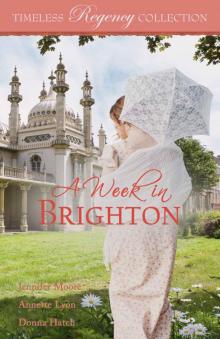 A Week in Brighton (Timeless Regency Collection Book 13)
A Week in Brighton (Timeless Regency Collection Book 13)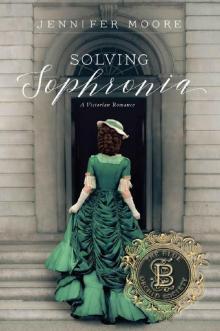 Solving Sophronia (The Blue Orchid Society, #1)
Solving Sophronia (The Blue Orchid Society, #1)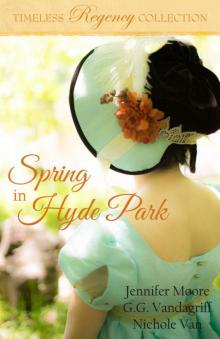 Spring in Hyde Park
Spring in Hyde Park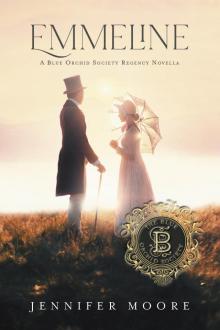 Emmeline
Emmeline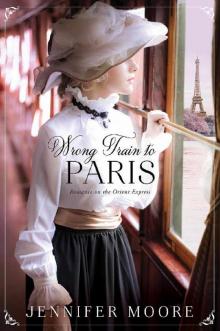 Wrong Train to Paris (Romance on the Orient Express, #2)
Wrong Train to Paris (Romance on the Orient Express, #2)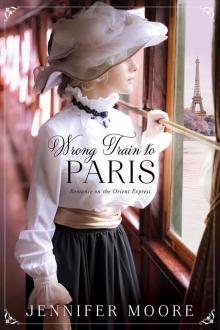 Wrong Train to Paris
Wrong Train to Paris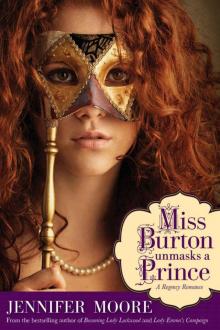 Miss Burton Unmasks a Prince
Miss Burton Unmasks a Prince Safe Harbor
Safe Harbor The Sheik's Ruby
The Sheik's Ruby Change of Heart
Change of Heart Lady Helen Finds Her Song
Lady Helen Finds Her Song Simply Anna
Simply Anna